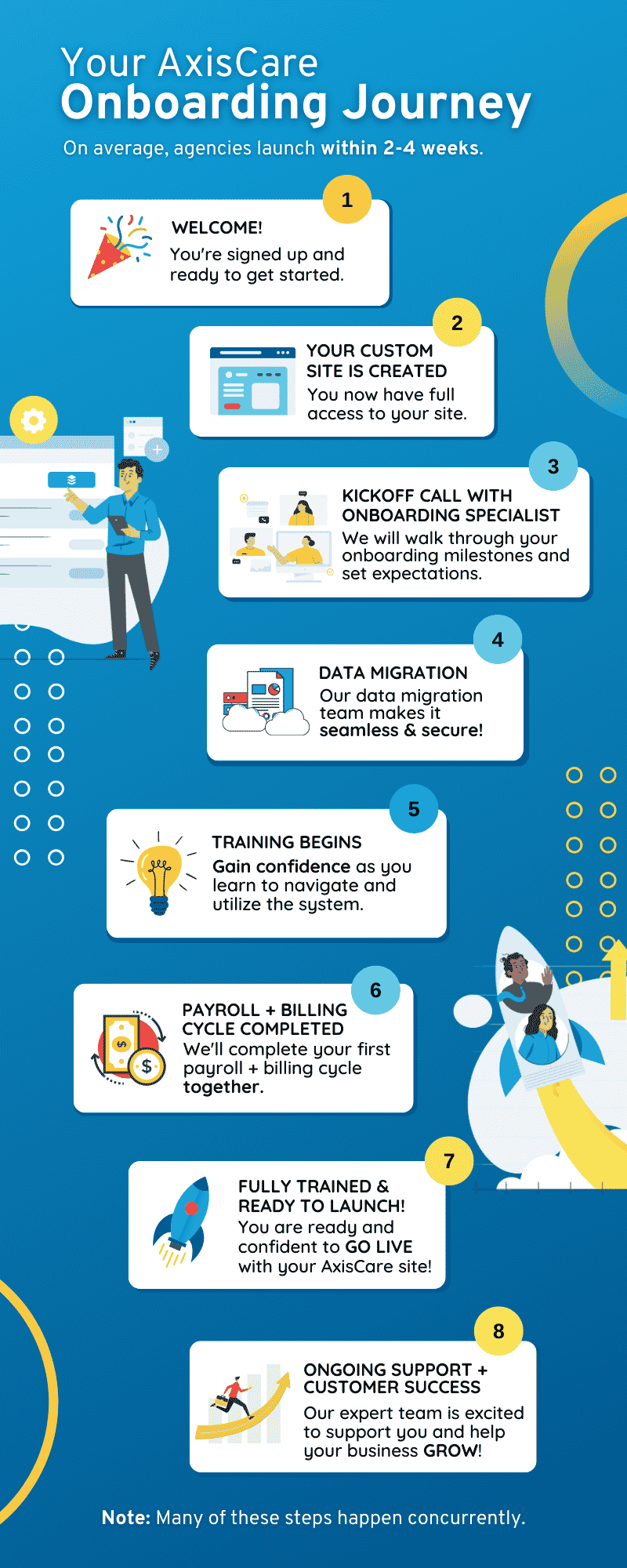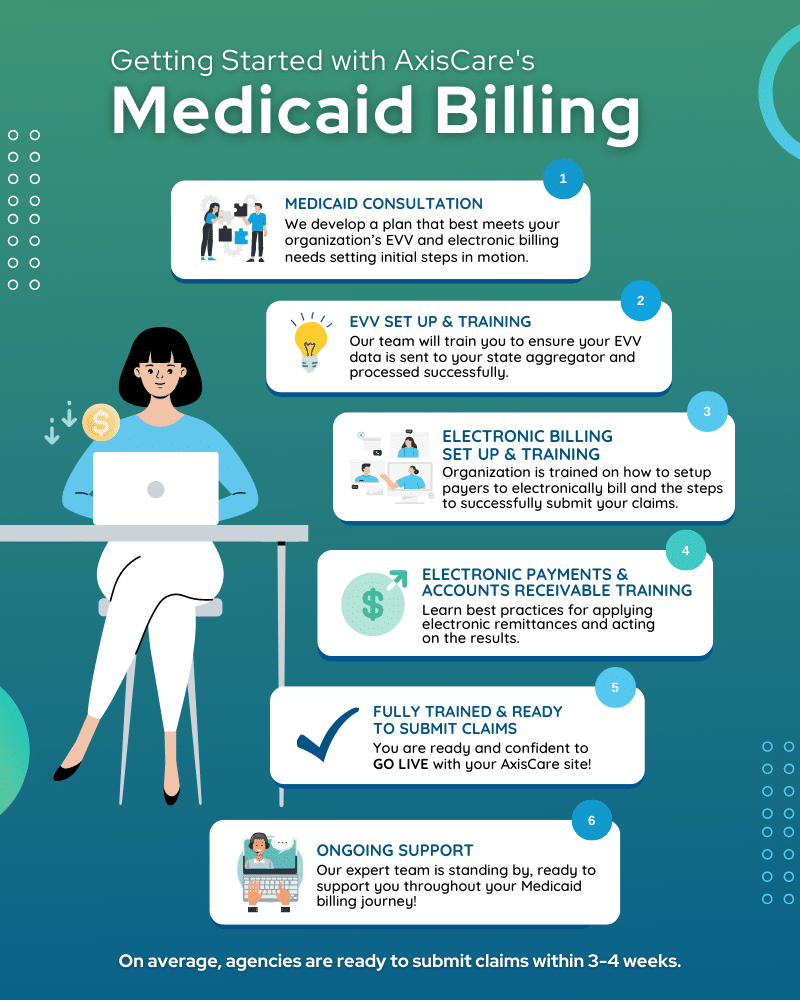Key Factors for Selecting Enterprise Home Care Software
In the rapidly evolving home care landscape, staying ahead and scaling against new competition requires dedication and the right technological support. For senior leadership at enterprise home care agencies, navigating various software platforms and choosing the right option as a strategic partner is vital to growth and efficiency. Here are some factors and features to consider for clear direction when navigating the complex world of home care software options and enterprise home care solutions.
In an industry as multifaceted as home care, software solutions are not one-size-fits-all. They are the backbone that ensures efficiency, compliance, and top-notch client care.
In your role at the helm of operations, you’ve seen the onslaught of challenges that home care agencies encounter. From managing client information and scheduling visits to monitoring care delivery, it’s a juggling act. A robust home care software solution not only streamlines these processes but also empowers your organization to deliver care with precision and compassion; think of it as an extra set of hands.
Essential Features to Consider
When evaluating software options, here are some nonnegotiable and pivotal features to consider:
- Electronic Visit Verification ensures compliance with state and federal mandates while making visit recording seamless. EVV also aids in diversifying your payer sources and the ability to serve Medicaid clients while also creating trust between the client and your agency.
- A robust scheduling platform that can reduce conflicts, anticipate needs, and adapt to changes is indispensable. Some options in the marketplace utilize intelligent algorithms to identify the best caregiver for the shift based on skills, ability, overtime, schedule history, and client preferences – further elevating the quality of care, proper allocation of resources, and caregiver retention efforts.
- Financial functions that connect seamlessly to care delivery can significantly reduce administrative burdens while keeping your agency’s cash flow healthy. Consider the in-house billing options for Medicaid, Long– Term Care Insurance, Veterans Affairs, and private pay with vendors on the market.
- The ability to tailor care plans to individual client needs is at the heart of personalized care. Custom forms and care plans reduce administrative burdens by allowing you to create and tailor forms exactly to your specifications, saving time and resources retrieving and capturing visit information.
Leveraging Data & Integration
Data is much more than just numbers. It provides valuable insights that help shape strategic decisions and improve client outcomes. The right home care software platform should assist you in accessing metrics for your locations, providing complete visibility into the health of your organization and aiding in making data-driven decisions. Some options in the marketplace feature custom reporting options, allowing you to manipulate and cater reports to your specific needs and departments focused on different KPI’s.
In the ecosystem of home healthcare, your software should speak fluently with pharmacies, hospitals, and other integrated partners. From payroll to third-party billing, caregiver training, and background checks, there are full-service solutions in the home care software space that integrate all your agencies’ needs in one convenient place.
Security & Support
Your data is the lifeline of your agency; making sure it’s safe and protected not only can provide peace of mind to you and your staff but also to the clients you serve. Heavily consider options who provide:
- data-encryption
- multifactor authentication
- cloud security
- ransomware protection
- frequent backups, and more.
The fear of switching software platforms is very valid. The process can be cumbersome, especially when looking at multiple locations. Weighing out the support and onboarding options across the software marketplace may open your eyes to the white-glove services and high–touch training and data migration options out there.
A pilot program of a single location can provide a glimpse into the interworking of the software and it’s favorability amongst your staff. A soft rollout in selected departments or with willing caregiver teams paves the way for real-world feedback and further catering of the training and onboarding to the remaining staff.
Flexibility, Scalability, & User Experience
The right home care software should be adaptable to the unique needs and processes of your organization. Look for platforms that equip you with customizable and scalable tools to aid you in the growth of your business, ensuring you aren’t at risk of out-growing your software as your business expands.
The ease of use of a caregiver–focused mobile app cannot be overstated. A mobile app that is intuitive, responsive, and built with your staff in mind will save time and empower your caregivers to focus more on the client and less on administrative tasks. Feedback mechanisms within the app play a critical role, offering caregivers a voice to share insights and concerns, enabling continuous improvement and adaptation in care strategies and your caregiver retention efforts. Time saved on documentation is time regained for patient engagement, observation, and, ultimately, more meaningful care delivery. The right software understands the vitality of these moments, enhancing not just the caregivers’ experience but enriching the quality of care received by those who depend on your services.
Choosing the Best Solution
The home care software market has a plethora of options ranging from out-of-the-box solutions to highly customizable platforms. Simplification and ease of use are paramount, but so is the capability to scale and adapt. Consider which options offer varying levels of complexity and customization that could serve enterprise-level demands.
Each agency has its unique blueprint, and using a flexible software that caters to those specific needs is critical. It’s about finding your strategic partner in software form—a solution that understands the rhythm of your tasks, your caregivers’ specific challenges, and your clients’ expectations.
Consider conducting a thorough audit of your agency’s requirements before diving into the available options on the market. Ask yourself:
- Where are the inefficiencies in our current workflows?
- How equipped are my coordinators and caregivers with our current software?
- Most importantly, how will the software shape the day-to-day experience of your staff and clients?
Adopting new software isn’t solely a technological upgrade—it’s a cultural shift. Therefore, securing buy-in from key stakeholders—whether through ROI demonstrations or spotlighting enhanced care delivery—is foundational. Consider vetting software by asking for testimonials from current users who are at the same caliber of size and revenue as your agency.
Start With AxisCare:
In this age where technology meets personalized care, making informed decisions about software purchases remains top of mind. The selection process is complex, but with a keen eye and a clear understanding of what your agency needs, you will be well– positioned to select a solution that not only promises more efficient operations but also better outcomes for those who depend on you.
Are you ready to take the next step in transforming your home care agency with the right software solution? Continue the conversation by booking a demo for a personalized consultation tailored to your organization’s unique needs.
Download our tip sheet, Choosing the Best Home Care Software for more information about selecting the right software for your agencies needs.









